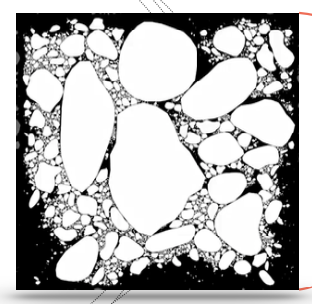|
| SASIP Newsletter | |  |
|
|
|
|
|
|
|
|
|
Follow Us |
|
|
|
|
Science Spotlight |
New article by Momme Hell and Chris Horvat: A method for constructing directional surface wave spectra from ICESat-2 altimetry |
Surface waves impact Sea Ice Fracture in the MIZ, but wave attenuation in sea ice is one of the least constrained processes in current sea ice models. We hear how a method that provide 2D wave spectra in sea ice along ICESat-2 tracks. We use a combination of linear inverse methods and Monte-Carlo sampling on all 6 laser beams to constrain the wave spectra about every 25 km. This allows us to derive a large, global databases of wave attenuation in sea ice and will be on of the first examples of remote-sensing and data-driven parametrization for climate models. |
 |
|
|
Science Updates |
Learning a subgrid-scale parameterization of melt ponds and general model errors for neXtSIM |
Tobias Finn presented his and Simon Driscoll’s recent work in WP4 at a Cross-VESRI mini-Symposium on “Non-locality in Parameterizations”. He spoke about the hypothesis that deep learning can enable such a non-locality and discussed if it is needed and feasible for sea-ice models. Based on Simon’s recent results, Tobias has shown that neural networks are sufficient in emulating and replacing a parametrisation of melt ponds on sea ice so as to run online without substantial instability or drift in a column model of sea ice thermodynamics.
In contrast, in analysing the sensitivity of his developed model error correction, he revealed that non-locality helps to correct errors coming from subgrid-scale dynamics. He concluded that, for sea-ice models, there is not always a need of non-locality but that deep learning makes it feasible and can be used as tool to discover such needs. |
|
News |
February webinar with Francesca Vittorioso from the University of Bologna 👩🏫 |
Francesca will present her latest research on the contribution of the assimilation of MTG/IRS radiances for the characterisation of the atmospheric chemical composition over Europe. Join us on Wednesday, February 21 at 3 PM CET |
|
Webinar with our guest Sebastian Reich from the University of Potsdam on March 19, 3 PM CET: Particle-based algorithms for stochastic optimal control |
The solution to a stochastic optimal control problem can be determined by computing the value function from a discretization of the associated Hamilton-Jacobi-Bellman equation. More recently, the problem has also been viewed from the perspective of forward and reverse time SDEs. This approach is closely related to techniques used in diffusion-based generative models. In this talk, this approach is extended to a wider class of stochastic optimal control problems and combined with ensemble Kalman filter type and diffusion map approximation techniques in order to obtain efficient and robust particle-based algorithms. Registration form coming soon! |
Ocean Sciences Meeting 2024 in New Orleans on February 22 |
Samuel Brenner, Christophe Horvat and colleagues will present their work on Floe-scale effects on ice-ocean boundary layer turbulence. Using a sea ice discrete element model, they investigate how floe collisions ("floe-floe interactions") and the relative scales of ocean variance ("floe-flow interactions") jointly impact ice-ocean coupling and contribute to the generation of turbulence in the ice-ocean boundary layer. |
SIAM conference on Uncertainty Quantification (UQ24) in Trieste on February 28 |
Alberto Carrassi et al. will present the recent results gained by WP4 for data assimilation and machine learning in sea-ice modelling.
Tobias Finn, Charlotte Durand, Flavia Porro, et al. will speak about how generative deep learning as popularized by image generation tools can be used for geophysical modelling with a specific focus on multivariate surrogate modelling of neXtSIM. |
Welcome on board ! |
| Francesca Vittorioso, Postdoc, University of Bologna
The objective of my PhD work was to study the contribution that the assimilation of data from InfraRed Sounder (IRS), that will fly on board MTG, could make in the characterization of the atmospheric chemical composition over Europe. In the context of SASIP and WP4, I will be dealing with data assimilation, but applied to a domain that is new for me, namely sea-ice. |
|
|
|
|
|
|
|
|
|
| Aikaterini Tavri, Postdoc, Brown University
My research investigates the impact of waves on sea ice by analyzing remote sensing datasets. As a specialist in sea ice microwave remote sensing, I am interested in leveraging satellite observations to enhance the accuracy of climate model retrievals. |
|
|
|
|
|
|
|
|
|
| Nicolas Mokus, Postodoc, CNRS
My PhD research focused on studying the local effect of waves on the floe size distribution, as well as the reciprocal attenuation of the waves by the ice cover. This postdoc in SASIP is an opportunity to further develop these themes. By developing parametrisations to inform large-scale models, we aim to take a step back and connect wave-ice interaction to the global climatology. |
|
|
|
|
|
|
|
|
|
Vacancies 👩💻 |
|
Two positions will be open in spring 2024: A PhD position at LOCEAN to work of the impact of BBM rheology on the representation of leads and polynyas in particular in the Southern Ocean; A postdoc position at CECI to investigate the impact of BBM rheology changes at large-scale.
Stay tuned for more details about these job offers! |
|
|










